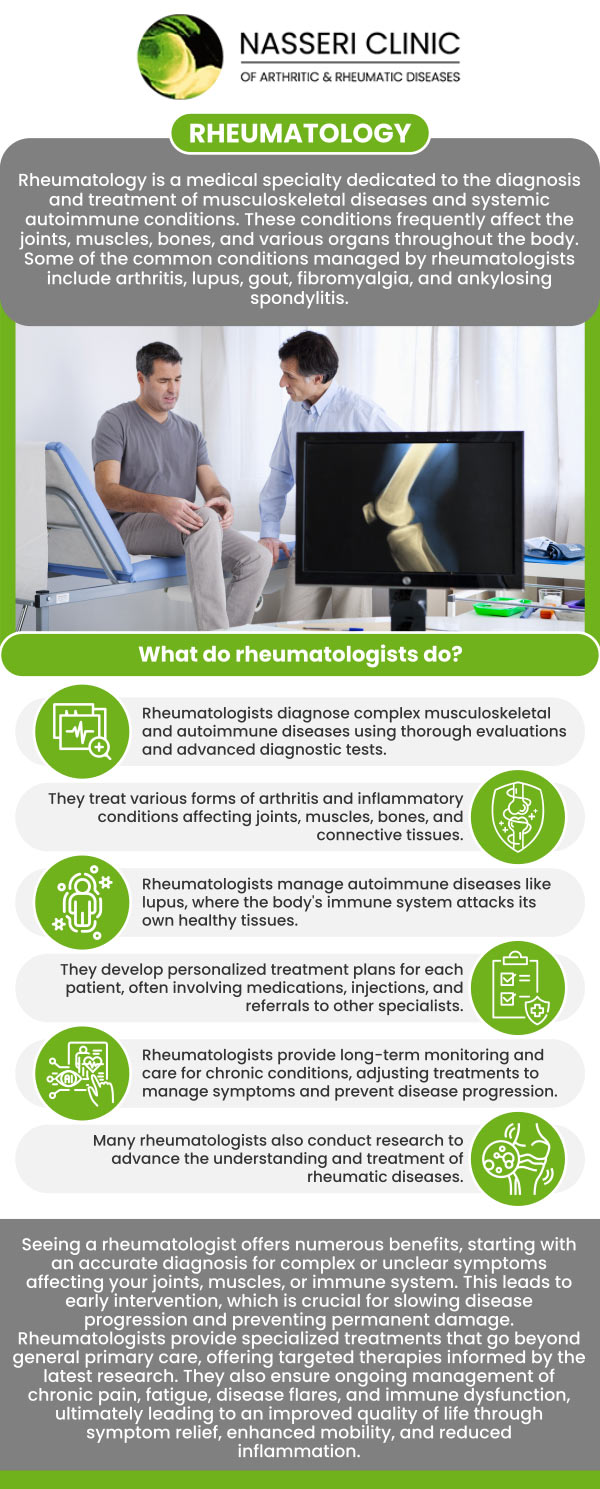Top Rheumatologist in Glen Burnie, MD
A rheumatologist diagnoses and treats arthritis and other immune-related diseases, often prescribed by a doctor for patients experiencing joint pain, swelling, and fatigue. Dr. Nasser Nasseri and his team at the Nasseri Clinic of Arthritic and Rheumatic Diseases diagnose rheumatic diseases through a comprehensive medical history and physical examination and offer an appropriate treatment plan. For more information, contact us or schedule an appointment online. We are conveniently located at 203 Hospital Dr, Suite 300B, Glen Burnie, MD 21061.




Table of Contents:
What to expect when you go to a rheumatologist?
Which autoimmune disease is related to rheumatology?
What autoimmune diseases does a rheumatologist test for?
What blood tests does a rheumatologist do?
By seeing a rheumatologist for the first time, you are taking a step toward managing rheumatic symptoms, such as chronic fatigue or fever caused by arthritis, fibromyalgia, lupus, or another autoimmune disorder. At your initial appointment, the rheumatologist will ask about your symptoms, their duration, and their severity. They will also ask you about your personal and family medical history to assess if you are genetically predisposed to certain rheumatic conditions.
Additionally, the doctor will perform a thorough physical exam with a focus on the joints and muscles. During the physical exam, the rheumatologist will check for swelling, redness, and other signs of inflammation, as well as assess the range of motion in your joints.
Based on the discoveries of your initial visit, the doctor may order additional tests to diagnose your condition, such as X-rays or other imaging studies. You should be prepared to discuss your lifestyle habits to help the rheumatologist develop an in-depth understanding of how your symptoms affect you. After diagnosing your condition, the doctor will discuss the recommended treatment plan with you to help you successfully manage your symptoms and prevent them from interfering with your life.
Autoimmune rheumatic diseases are a group of disorders in which the immune system mistakenly attacks the body’s tissues, affecting the joints, muscles, and connective tissues. These diseases are a primary focus of rheumatology and include:
• Systemic Lupus Erythematosus – Lupus is a complex autoimmune condition that causes symptoms like fatigue, fever, rash, and joint pain.
• Rheumatoid Arthritis (RA) – This is a chronic inflammatory disorder affecting the joints and surrounding tissues. RA is characterized by painful swelling, tenderness, and stiffness in the affected joints, potentially leading to joint deformity over time.
• Ankylosing Spondylitis – This is a type of arthritis that affects certain parts of the spine and can lead to severe pain, stiffness, and other symptoms.
• Scleroderma – This group of autoimmune diseases causes the skin to tighten and harden. Scleroderma may cause problems in the digestive tract, blood vessels, and internal organs.
Rheumatologists test for a wide range of autoimmune conditions. When you come in to see a rheumatologist, they will assess your current symptoms, go over your medical history, and perform a physical exam to determine whether it’s likely that an autoimmune condition is behind your discomfort. If the doctor needs to confirm a diagnosis, additional screenings, such as blood tests or imaging studies, may be ordered.
The diagnostic process allows the rheumatologist to accurately pinpoint whether an autoimmune condition is at the root of your symptoms. It’s important to keep track of your symptoms, including their frequency and severity, to relay this information to the rheumatologist during your appointment.
In some cases, it will take the specialist more than one appointment to provide you with a diagnosis. This often happens because autoimmune diseases can present complex and overlapping symptoms that evolve. The rheumatologist may need to observe the progression of your symptoms to accurately pinpoint a diagnosis.
Rheumatologists use a variety of blood tests to diagnose and monitor autoimmune and inflammatory diseases. These tests allow the doctor to assess the presence of inflammation, the function of organs, and the presence of certain antibodies that could indicate an autoimmune disorder.
For example, the C-reactive protein (CRP) test is used by rheumatologists to measure inflammation in the body. In addition, the rheumatoid factor test is used to detect the presence of an antibody found in most people with rheumatoid arthritis. Another blood test known as the antinuclear antibody (ANA) test is employed by doctors to look for antibodies that bind to the contents of the cell nucleus. The ANA test can be used to diagnose lupus, scleroderma, and other autoimmune rheumatic diseases.
These blood tests are used as part of the diagnostic procedure carried out by doctors specializing in rheumatology. In addition to blood tests, rheumatologists also use the findings of physical examinations and imaging studies to form accurate diagnoses, guide treatment decisions, and monitor disease progression.
Looking for the top rheumatologist near Glen Burnie, MD? Visit Nasseri Clinic of Arthritic and Rheumatic Diseases to get services from our top rheumatologist, Dr. Nasser Nasseri, MD. For more information, contact us or schedule an appointment online. We are conveniently located at 203 Hospital Dr, Suite 300B, Glen Burnie, MD 21061. We serve patients from Glen Burnie MD, Pasadena MD, Jacobsville MD, Ferndale MD, Severn MD, and surrounding areas.
Check Out Our 5 Star Reviews


Additional Services You May Need

Additional Services You May Need
▸ Arthritis Care
▸ Infusion Therapy
▸ Lab Services
▸ Radiology
▸ NCARD NRACE
▸ BioFlex Laser Therapy
▸ Ultrasound Guided Injection
▸ NCARD PRP
▸ NCARD Myers
▸ Rheumatology
▸ Myositis
▸ Osteoporosis
▸ Ulcerative Colitis
▸ Multiple Sclerosis
▸ Saphnelo Infusion
▸ Injection Treatments
▸ Intravenous Immunoglobulin Therapy
▸ Asthma
▸ Crohn’s Disease
▸ Fibromyalgia
▸ Infusion Therapy for Gout
▸ Inflammatory Eye Disease
▸ Inflammatory Skin Disease
▸ Vasculitis
▸ Iron Deficiency
▸ Lupus


